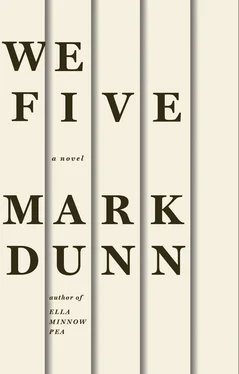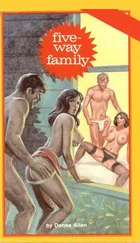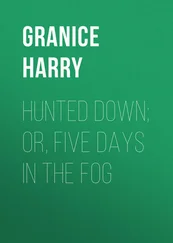Jane sought to stay her friend with a fluttering hand. “Do be kind, Ruth. This is all quite new to Carrie.” Then, turning to the recipient of Ruth’s uncharitable remarks, Jane said with softer accents, “Carrie, it is the dream of every girl to be pursued by multiple suitors. If it so happens during Sunday’s outing that these two men end up fighting over you, rejoice! Be glad for the attention, regardless of how much blood may be spilt.”
Carrie relaxed into a half smile, which quickly transformed itself into a smile in full, accompanied by carefree, girlish, giggling laughter.
Ruth lifted herself — and then her chair — and returned surlily to her own worktable. Jane and Carrie, who bethought themselves at first that Ruth would apply herself wordlessly to her work, were mistaken. Ruth did speak. She said, “You aren’t the only one of us who can sing, Carrie. We all sing. And quite beautifully, I might add.”
“That is certainly true,” replied Carrie, who, with Jane still sitting hard-by, returned her attention to her eagerly receptive friend to disclose: “His body is quite well-formed, Jane. His look reminds me of that picture of Hercules in Bulfinch’s. ”
“Bull cods !” expostulated Ruth in a rude voice, making certain to scrape her chair loudly upon the slate floor to keep the oath from a precise audit by her two companions.
But even though there was no guessing from Carrie and Jane about Ruth’s tenor or her present state of ill humour, they purposefully ignored it.
Molly Osborne delivered Mrs. Dowell’s grey satin pelisse into the hands of the woman’s maid-of-all-work. She was upon her return to Mrs. Colthurst’s dress shop when she was hailed in the High Road by her cousin, Jemma Spalding. Though Jemma, who was the child of Mr. Osborne’s sister Cecily Spalding, was only one year older than Molly, yet the two had not been close since childhood, for as Jemma grew older she began to display a capricious nature that removed common sense altogether from the equation of her life, and became unpredictable and erratic in her behaviour, once taking it to mind to have a bathe in the stream that meandered behind the church she attended, and to do so right after morning services and whilst still dressed in all her Sunday finery. There were some who thought her mad. Molly did not. To Molly, her cousin was merely maddeningly eccentric.
Having completed her marketing for the morning, Jemma was bending her steps to the home of an old woman she knew who lived in a crooked house on the apron of town — a woman who, Jemma explained to Molly as they walked along, was of gipsy stock, but no longer roamed the countryside to sell gispy jewellery and colourful hand-knitted scarves and shawls, but was now settled upon a little piece of tenant land, where she raised poultry and grew parsnips and did only one thing that she confessed was a residual indulgence from her former life: she told fortunes.
“I have my fortune told once a fortnight,” said Jemma, with a look that conveyed a great eagerness to see the woman again. “Then I hurry home and tell Mamma and Papa all that Madame Louisa has told to me. Alas, they never believe me — not even when those things which were predicted come true. Yet I know that the Madame has a rare gift, and I cannot help wishing I had leave and means to tell a good many others about it.”
Molly smiled with genial indulgence. “That is all very interesting, Jemma, but I must go back to work now. The dress shop is just round the corner.”
“Yes, I know, but won’t you come with me for just a few minutes to see my fortune-telling friend? I have nearly half a shilling left from my marketing and will be happy to pay to have your cards read for a change. Aren’t you the least bit curious to know what your future holds?”
“Who isn’t curious to know such a thing?” returned Molly. “But I cannot spare another moment. Mrs. Colthurst will wonder what has become of me.”
“I will tell her you were helping me — that I sprained my foot and my basket was so heavily laden with vegetables and eggs that I simply could not hobble home without assistance.”
“And that would be a falsehood. I do not tell falsehoods, Jemma — as a rule.”
“As a rule, no. But as an exception, you have been known to dissemble without the tiniest scruple — such as the time when we were girls and found the kittens and their mother in my father’s barn and made a nice nest for them and brought little kitchen scraps for the mother each morning before school, because we knew she could not be both a successful mother and a successful mouser under the circumstances. We kept the secret together, did we not? For we both knew that Papa would drown the little ones if he should ever find out about them.”
“That was an exceptional situation, Jemma. The lives of five kittens hung in the balance.”
“But this is equally exceptional. My last reading was quite disconcerting.”
“What do you mean?”
“I cannot say. Not until we hear what the future holds for you by way of comparison.”
Molly sighed cheerlessly. “Jemma, you’ve become tiresome.”
“Do come. It’s very important.”
“Yet you will not tell me why.”
“I cannot. Not just yet.”
Molly thought for a moment, her brow knitted in annoyance. “My dear cousin, there is a reason the children in our town make up little rhymes about you.”
“I am different, I’ll admit. But this hardly resembles the times I climb the roof of my father’s cottage wearing wings fabricated from chicken feathers to fly myself off and away to London for the season.”
“When did you do this?”
“I’d rather not say,” replied Jemma, whilst brushing a chicken feather from the left gigot of her frock.
“I will warrant, Jemma, that there are extremes to your behaviour, and by comparison this request does seem very nearly reasonable.” Molly sighed. “So let us go quickly to hear what the gispy woman says, and I should hope very much that she will not foretell how I am to be cashiered by Mrs. Colthurst for shirking my responsibilities at the shop.”
Molly had never seen a woman so burdened by troubled thoughts as the scarf-headed Madame Louisa. Jemma responded to the old woman’s expression of worry by delivering soothing pats to her shawl-draped shoulders. Madame Louisa answered Jemma’s thoughtful enterprise by producing an appreciative glimmer of a near-toothless smile, which showed bravery in the face of apparent desolation.
“It has happened again,” confided the old gipsy in a low tone. “Three times, in fact, since your last visit, Jemma.”
“Three times out of how many?” asked Jemma. She was now patting the old woman with a much stronger hand, for it seemed required.
“Out of three,” the woman answered glumly. “For after these I shut my door and locked it tight. I only admitted the two of you this morning for I have decided that I must have someone to whom to confess my fears. And they are dark and terrible fears, indeed.”
“And how did the three react when they heard what the stars foretold for them?”
“I confess — I could not bring myself to speak the truth as the cards conveyed it to me.” Madame Louisa took pause to blow her nose into her handkerchief and to dab at her tear-glistening eyes (and in that order, although a different order would have been tidier). “I told each of the three that which came most conveniently to mind, for if I had said what I actually saw upon the cards — what they had to say about the town at large — I should send them into a similar state of despondency, and I did not wish to be so cruel.”
Читать дальше












